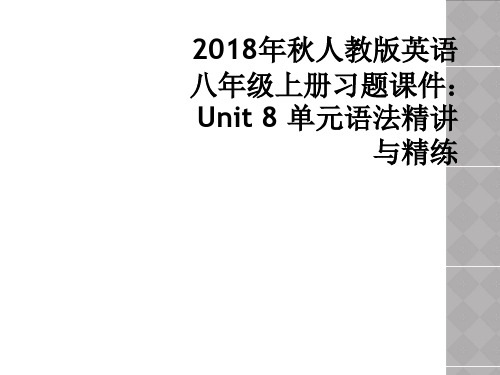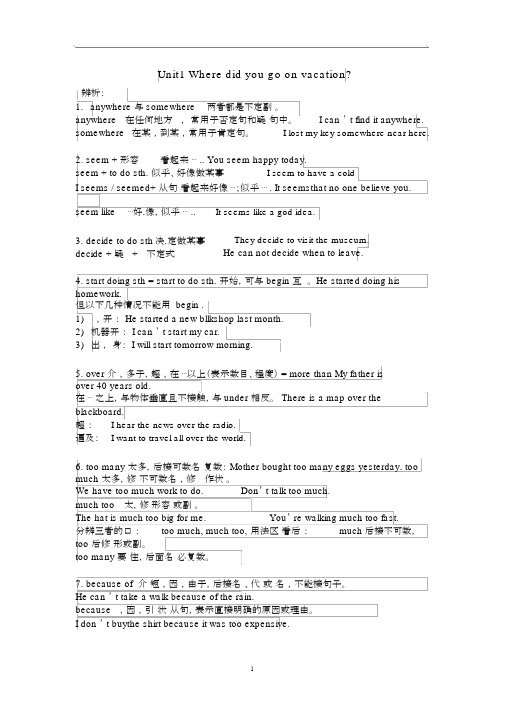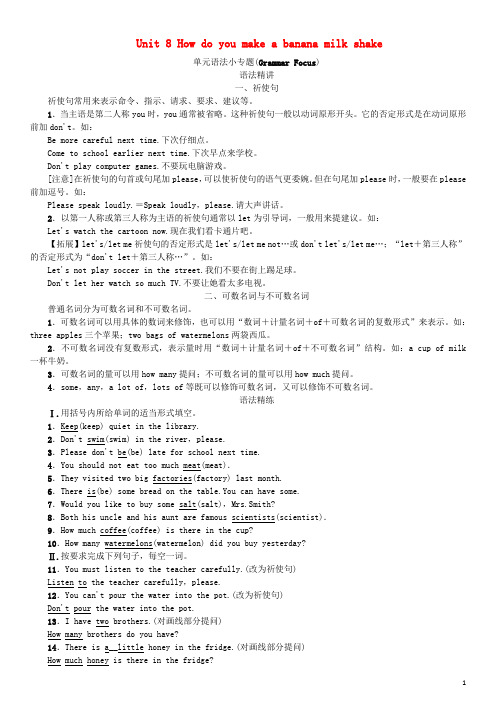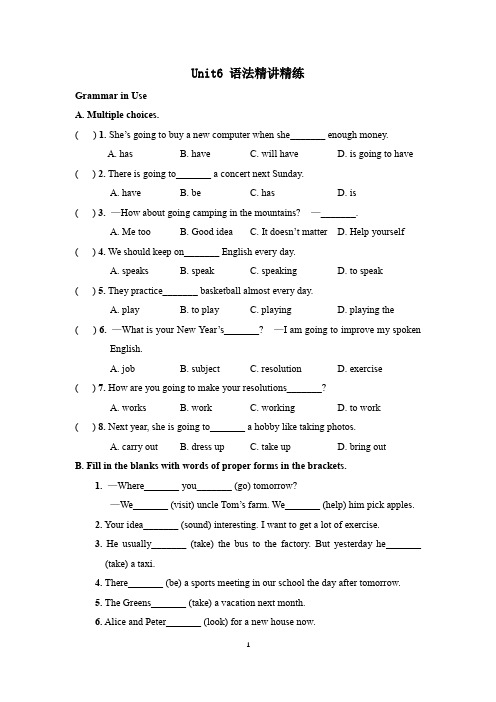新八上册_英语语法知识点精讲+练习
- 格式:doc
- 大小:123.00 KB
- 文档页数:9


Unit1 Where did you go on vacation?辨析:1. anywhere 与 somewhere两者都是不定副。
anywhere在任何地方,常用于否定句和疑句中。
I can ’ t find it anywhere. somewhere在某,到某,常用于肯定句。
I lost my key somewhere near here.2. seem + 形容看起来⋯ .. You seem happy today.seem + to do sth. 似乎、好像做某事I seem to have a coldI seems / seemed+ 从句看起来好像⋯;似乎⋯ . It seemsthat no one believe you. seem like⋯好.像,似乎⋯ ..It seems like a god idea.3.decide to do sth决.定做某事decide + 疑 + 不定式They decide to visit the museum. He can not decide when to leave.4.start doing sth = start to do sth. 开始,可与 begin 互。
He started doing his homework.但以下几种情况不能用 begin .1),开: He started a new bllkshop last month.2)机器开: I can ’ t start my car.3)出,身: I will start tomorrow morning.5.over 介,多于,超,在⋯以上(表示数目、程度) = more than My father isover 40 years old.在⋯之上,与物体垂直且不接触,与under 相反。
There is a map over the blackboard.超:I hear the news over the radio.遍及:I want to travel all over the world.6.too many 太多,后接可数名复数: Mother bought too many eggs yesterday. too much 太多,修不可数名,修作状。

英语八年级上册(Unit1-Unit12)短语重点句子语法归纳及练习整理左小英Unit 1How often do you exercise?短语1. go to the movies=go to the cinema 看电影2. look after=take care of 照顾3. surf the Internet 上网4. healthy lifestyle 健康的生活方式5. go skateboarding 去划板6. (be) in good health =(be)healthy身体健康7. keep healthy=keep in good health 保持健康8. as for至于9. take/do exercise=play/ do sports锻炼,做运动10. eating habits 饮食习惯11. the same as 与……相同12. once a month一月一次13. be different from 不同14. twice a week一周两次15. make a difference to 对什么有影响16. how often 多久一次17. although=though虽然18. most of the students=most students大多数学生19. activity survey活动调查20. go shopping=do some shopping 购物21. do homework做家庭作业22. do housework做家务事23. junk food垃圾食物24. be good/bad for 对……有益(害)25. on/at weekends 在周末26. want to do sth=would like to do sth=feel like doing sth 想要做某事27. want sb to do sth= would like sb to do sth想要某人做某事28. try to do sth 尽量做某事try doing sth.试着做某try one’s best to do sth.尽力做某事29. come home from school放学回家30. of course=certainly=sure当然31. get good grades取得好成绩32. help sb ( to )do sth 帮助某人做某事,33. help sb with sth在某方面帮助某人34. a lot of =lots of=many /much许多,大量的2. 频度副词:always usually often sometimes hardly ever hardlynever twice a month对以上提问用?3.重点句子:1.What do you usually do on weekends? I usually play soccer.2.How often do you shop? I shop once a month.3.Here are the results of the activity survey.4.She says it is good for my health.5.How many hours do you sleep every night?6.My eating habits are pretty good.7.I try to eat a lot of vegetables.8.I eat fruit and drink milk.9.I sleep 9 hours every night.10.My healthy lifestyle helps me get good grades.11.Is here lifestyle the same as yours or different?12.What are the differences.13.I think I am kind of unhealthy.14.What sports do you play?15.You must try to eat less meat.16. I go to meet my friends twice a week.语法:1.区分 how often/far/long/soon 其中:how far 指路程;how long 指时间,答语用for+时间段, since+时间点; how soon 指时间,答语用 in+时间段,用于一般将来时2. although = though 不与 but 连用。

Unit 8 How do you make a banana milk shake单元语法小专题(Grammar Focus)语法精讲一、祈使句祈使句常用来表示命令、指示、请求、要求、建议等。
1.当主语是第二人称you时,you通常被省略。
这种祈使句一般以动词原形开头。
它的否定形式是在动词原形前加don't。
如:Be more careful next time.下次仔细点。
Come to school earlier next time.下次早点来学校。
Don't play computer games.不要玩电脑游戏。
[注意]在祈使句的句首或句尾加please,可以使祈使句的语气更委婉。
但在句尾加please时,一般要在please 前加逗号。
如:Please speak loudly.=Speak loudly,please.请大声讲话。
2.以第一人称或第三人称为主语的祈使句通常以let为引导词,一般用来提建议。
如:Let's watch the cartoon now.现在我们看卡通片吧。
【拓展】let's/let me祈使句的否定形式是let's/let me not…或don't let's/let me…;“let+第三人称”的否定形式为“don't let+第三人称…”。
如:Let's not play soccer in the street.我们不要在街上踢足球。
Don't let her watch so much TV.不要让她看太多电视。
二、可数名词与不可数名词普通名词分为可数名词和不可数名词。
1.可数名词可以用具体的数词来修饰,也可以用“数词+计量名词+of+可数名词的复数形式”来表示。
如:three apples三个苹果;two bags of watermelons两袋西瓜。
2.不可数名词没有复数形式,表示量时用“数词+计量名词+of+不可数名词”结构。

八年级英语unit6&7一、一般将来时态1.一般将来时表示将来某个时间将要发生的动作或存在的状态,也表示将来经常或反复发生的动作。
一般将来时由助动词shall或will加动词原形构成,shall用于第一人称,will用于第二、三人称。
但是现在第一人称一般也用will,其区别并不明显。
肯定句:People will live to be 200 years old.否定句:______________________________________________一般疑问句:_______________________________________ 回答__________________________特殊疑问句:____________________________________________2. “be going to + 动词原形, 现在进行时表示将来,表示马上要发生的事情,或者计划好要发生的事情。
肯定句:I was going to be an astronaut when I was young.否定句:_____________________________________________一般疑问句:_________________________________________ 回答__________________________ T特殊疑问句:__________________________________________________3.表示将来的时间词汇:_____________________________________________________My father will leave for China next week.(改同义句)_________________________________________________________练习:1. Kids will come back to school tomorrow.Kids _________come back to school tomorrow.(改为否定句)_______ _______ come back to school tomorrow(改为一般疑问句)Yes,_______ _______./ No,_______ _______.(作肯定及否定回答)2. There will be a heavy rain tomorrow._______ _______ be a heavy rain tomorrow. (改为否定句)_______ _______ _____ a heavy rain tomorrow? (改为一般疑问句)Yes,_______ _______./ No,_______ _______.(作肯定及否定回答)3. 用所给词的适当形式填空.(1)In five years, I ________ (be) able to ______ (go) to college.(2)There will be _____ (little) pollution in the future.(3)In ten years, she _______ (be) a doctor. Now she ______ (be) a student. (4)People ______________ (fly) rockets to the moon for vacations one day. (5)Linda _______ (study) in a language school three years ago.She _______(become) an English teacher in two years.二、语法, a little ,few, a few 的区别_______________________________________________________________________much, many 的区别_______________________________________________________________________2. pollution意为___________,词性:________。

Unit6 语法精讲精练Grammar in UseA. Multiple choices.( ) 1. She’s going to buy a new computer when she_______ enough money.A. hasB. haveC. will haveD. is going to have () 2. There is going to_______ a concert next Sunday.A. haveB. beC. hasD. is() 3.—How about going camping in the mountains? —_______.A. Me tooB. Good ideaC. It doesn’t matterD. Help yourself () 4. We should keep on_______ English every day.A. speaksB. speakC. speakingD. to speak() 5. They practice_______ basketball almost every day.A. playB. to playC. playingD. playing the ( ) 6.—What is your New Year’s_______? —I am going to improve my spoken English.A. jobB. subjectC. resolutionD. exercise() 7. How are you going to make your resolutions_______?A. worksB. workC. workingD. to work() 8. Next year, she is going to_______ a hobby like taking photos.A. carry outB. dress upC. take upD. bring outB. Fill in the blanks with words of proper forms in the brackets.1.—Where_______ you_______ (go) tomorrow?—We_______ (visit) uncle Tom’s farm. We_______ (help) him pick apples.2. Your idea_______ (sound) interesting. I want to get a lot of exercise.3.He usually_______ (take) the bus to the factory. But yesterday he_______(take) a taxi.4. There_______ (be) a sports meeting in our school the day after tomorrow.5. The Greens_______ (take) a vacation next month.6. Alice and Peter_______ (look) for a new house now.7. John_______ (leave) for Shanghai next Monday.8. Look at the sky. There are many black clouds. It_______ (rain) soon.【语法解析】能用be going to结构谈论对未来的打算。
新版牛津版 8上 Unit 7 语法知识点讲解与练习一、知识点1.bring, take的区别:bring意为“带来”,强调带到说话人这边来。
Bring sb. sth.=bring sth. to sb.Take意为“带走”,是指从说话人这把某物拿走。
2. look cool 看起酷feel cool 感觉酷3. the best time to do sth.最某事的最佳时间,此处为动词不定式作后置定语,修饰前面的名词。
4. favourite=like best 最喜欢Which is your favourite season? =Which season do you like best?5.be full of = be filled with 充满…两者区别不大,基本可以通用。
Be full of强调状态,be filled with强调过程The box is full of apples. = The box is filled with apples.1.Forget to do sth. 忘记要做某事forget doing sth. 忘记已做过某事与remember的用法相同。
Remember to do sth. 记得要做某事remember doing sth.记得做过某事2.Be far away, be far from 与be+具体的距离+away froma.Be far away 意为遥远,后面不跟地点。
Eg: My school is far away.b.Be far from 意为离…远,后面跟地点。
Eg: My school is far away from my home.c.Be+具体的距离+away from表示具体的远。
Eg: My home is 20 kilometers away from the hospital.3.What a perfect time to fly a kite!真是一个放风筝的完美时间啊!a.What + a/an +adj.+ 单数可数名词+主语+谓语!What a fine day it is!b.What+ adj. +可数名词复数或不可数名词+主语+谓语!What kind women they are!4.Turn的用法a.Turn动词,意为变化,尤指颜色方面的变化。
人教版英语八年级上册Unit 8 How do you make a bananamilk shake?单元语法讲解和练习Grammar语法讲解1.祈使句以下句子均为祈使句。
1.Go and wash your hands.(命令)2.Be quiet (please).(请求)3.(Please) Be kind to your sister.(劝告)4.Take a taxi, or you'll miss your class.(建议)5.Look out! Danger!(警告)6.Keep off the grass.(禁止)1.祈使句:基本结构(1)行为动词开头由“—动词原形+其他部分”构成,动词没有人称和时态的变化。
■Make a sentence with the word "peace”.■Have a great time.(2)动词Be开头由”Be+其他部分(形容词、名词或介词短语等广构成。
Be careful when crossing the street.(3)Let开头由“Let+宾语+动词原形+其他部分”(动作执行不包含听话者) 或"Let's+动词原形+其他部分”(动作执行包含听话者在内)构成。
■Let him go back now.Let us try again.(不含听话者)让我们再试一下吧。
■Let's try again.咱们再试一下吧。
祈使句:否定形式(1)行为动词和be开头的祈使句的否定形式为在句首加Never或Don't■Never/Don!t say that again!■Never/Don^ be careless. o(2)Let开头的祈使句■Don't let me go with her tomorrow.=■Let me not go with her tomorrow.可在Let前加Dont,也可在Let后宾格的名词或代词后面加note如果以Let's开头的祈使句,必须在Let's后加not。
八年级英语上册Unit 7知识点及练习题(新版新目标)一,时态复习前练习:1.The next tie u see Nis, he ________ sixteen ears ldA ill beB is asD ill2.argt ________ puter siene last earA studiesB studied ill studD is studing3.In ten ears, hn ________ an astrnautA isB ill be asD ill4.H an peple ________ there fift ears agA illB ere areD ill be-He ae earl this rning, didn’t he?-es, he did He ften___ t shl earlA eB es ae D has e6 The sun ___ in the east and___ in the estA raises; setB rise; sets rises; sets D rises; set7 -I usuall have il and bread fr breafast hat abut u, i?-S d I, but sister ___A hasn’tB desn’t didn’t D n’t8 She ill g if it ___ trrA isn’t rainB dn’t rain desn’t rain D didn’t rain9 -___ he ___ t r n ft?-es, he___A D; g; dB Des; g; des Is; ging; des D Des; g; is10 I ___ hat the ld an said is rightA a thiningB is thught thin D thught时态分类:1,一般将时常与trr,next 引导的短语(如next ee),this引导的短语(如this ear),fr n n;in the future,in+一段时间等连用。
新版牛津版 8上 Unit 8 语法知识点讲解与练习一、知识点1.rain的用法a.Rain作为动词,意为下雨,降雨。
It was raining hard when I got home yesterday evening.b.Rain作为名词,意为雨,大雨。
Don’t go out in the rain.新| 课 |标|第 | 一| 网c.Rainy是形容词,意为有雨的,下雨的。
Spring is a rainy season in this country.2.all的用法a. 副词,意为完全地,十分地。
Eg: He is all wrong.b. 形容词,意为一切的,所有的,全部的。
Eg: All the students in our school are friendly to us.c. 代词,意为一切,全部,后接复数动词,表示全体,大家。
All goes well.3. final: a. 用作名词,意为决赛。
Our school football team goes to the final.b. 用作形容词,意为最后的。
I didn’t read the final chapter of the book.4. thousands of people成千上万的人hundred of, millions of如果hundred, thousand, million等前面加具体数字时,不可以用复数,也不可以和of连用。
5.wash away把…冲走wash off 使某物被冲洗走wash out 洗干净,洗掉wash up洗去,把…冲上岸6. hear of听说hear from sb.收到某人的来信7. like与as的区别Like与as都表示“像…”,但like是介词,后接名词、代词或动名词,不可接从句;而as为连词,后接从句。
Like every other students, Tom is bad at grammar.When in Rome, do as the Romans do. X|k | B | 1 . c |O |m8.in fear在恐惧中in surprise惊讶地in danger处于危险中in a hurry匆忙地in poor health 健康欠佳9.try one’s best to do sth. 尽力做某事= do one’s best to do sth.Try doing sth. 设法、试图做某事10.in all directions = in every direction 向四面八方direction作名词,还可意为指示,说明3.Not…at all一点也不,根本Not at all 不用谢4.Since, as, because三个词都表示因为,引导原因状语从句。
新目标八年级上册英语语法知识点精讲+练习(一)一般将来时一般将来时表示将来某个时间要发生的动作或者存有的状态。
通常与表示将来的时间状语连用,如tomorrow, the day after tomorrow, next year, next month, next week, in 100 years等。
be going to do(动词原形)结构:表示打算、准备做的事情或者肯定要发生的事情。
如:It is going to rain.will do结构表示将来的用法:1. 表示预见Do you think it will rain?You will feel better after a good rest.2. 表示意图I will borrow a book from our school library tomorrow.What will she do tomorrow?基本构成如下:一般疑问句构成:(1)will+主语+do…? Will Sarah come to visit me next Sunday?(2)there be 结构的一般疑问句:Will there + be …?Will there be fewer trees? Yes, there will. / No, there won’t否定句构成:will + not (won’t)+doSarah won’t come to visit me next Sunday.特殊疑问句构成:特殊疑问词+will+主语+…?What will Sarah do next Sunday?★★练一练★★根据例句,用will改写下列各句例:I don’t feel well today. (be better tomorrow)I’ll be better tomorrow.1. Gina has six classes today. (have a lot of homework tonight)_____________________________2. I’m tired now. (sleep later)_____________________________3. My parents need a new car. (buy one soon)_____________________________4. We can’t leave right now. (leave a little later)_____________________________5. The weather is awful today. (be better tomorrow)_____________________________答案:1. She’ll have a lot of homework tonight.2. I’ll sleep later.3. They’ll buy one soon.4. We’ll leave a little later.5. Maybe it’ll be better tomorrow.(二)should的用法:should用来提出建议和忠告,后边加动词原形,否定句直接在should后边加not.例如:I think you should eat less junk food.我认为你应该少吃垃圾食品。
She drives a lot and she seldom walks. So I think she should walk a lot.她经常开车,很少走路。
所以我认为她应该多走路。
Students shouldn’t spend too much time playing computer games.学生们不理应花太多的时间玩计算机游戏。
学习向别人提建议的几种句式:(1)I think you should…(2)Well, you could…(3)Maybe you should …(4)Why don’t you…?(5)What about doing sth.?(6)You’d better do sth.★★练一练★★用should或shouldn’t填空1. I can’t sleep the night before exams.You ______ take a warm shower before you go to bed.2. Good friends ______ argue each other.3. There is little milk in the glass. We _______ buy some.4. They didn’t invite you? Maybe you ______ be friendlier.5. I am a little bit overweight. So I think I _______ do exercises every day.答案:1. should 2. shouldn’t 3. should 4. should 5. should(三)过去实行时过去实行时表示过去某一点时间正在实行的动作或者过去某一段时间内一直实行的动作。
1. 构成was /were + doing,例如:I was watching TV at 9 o’clock last night.at 9 o’clock last night是时间点They were playing football all afternoon.all afternoon是时间段2. 过去实行时的标志词at 8 o’clock last night, this time yesterday等。
例如:I was having lunch at home this time yesterday.昨天的这个时候我正在吃午饭。
At that time she was writing a book.那阵子她在写一本书。
(表示她在那段时间里一直在做那件事情。
)★★练一练★★用括号中所给动词的适当形式填空。
1. This time yesterday I ____ ______(read)books.2. At 9 o’clock last Sunday they ______ ______(have)a party.3. When I _____(come)into the classroom, she ________ ______(read)a storybook.4. She _____ ______(play)computer games while her mother ____ ______(cook)yesterday afternoon.5. I _____ ______(have)a shower when you _______(call)me yesterday.答案:1. was reading 2. were having 3. came; was reading4. was playing; was cooking5. was having; called(四)间接引语形成步骤:(1)不要逗号,冒号,引号(2)要考虑到人称的变化(人称的变化与汉语是一致的)(3)要考虑时态的变化(4)要考虑时间状语、地点状语和语示代词的变化。
1.2.★★练一练★★用括号中所给动词的适当形式填空。
1. She said I _____(be)hard-working.2. Peter told me he _____(be)bored yesterday.3. She said she _____(go)swimming last Sunday.4. Bobby said he _____(may)call me later.5. Antonio told me he _____(read)a book then.答案:1. was 2. was 3. went 4. might 5. was reading 请转述他人说的话:1. I go to the beach every Saturday. (Tom)2. I can speak three languages. (Lucy)3. I will call you tomorrow. (Mike)4. I’m having a surprise party for Lana. (she)(五)if引导的条件状语从句结构:if+一般现在时,主语+将来时含义:如果……,将要……例如:If you ask him, he will help you.如果你请求他,他会协助你。
If need be, we’ll work all night.如果需要,我们就干个通宵。
★★练一练★★根据中文提示,完成句子。
1. 如果你参加聚会,你将会过得很开心。
If you ________ the party, you __________.2. 如果明天下雨,我们将不去野餐。
If it __________ tomorrow, we ___________.3. 如果你经常听英文歌,你将会喜欢英语的。
If you often ________, you _________________.答案:1. If you go to the party, you will have a good time2. If it rains tomorrow, we won’t go to the picnic3. If you often listen to English songs, you’ll like English二. 完形填空特点及解题思路(一)题型分类与特点完形填空试题是在给出的一篇短文中有目的地拿掉若干个词,留下一些空格,要求考生借助短文保留的部分,从所给的短文整体出发,在准确理解短文意思的基础上,根据句子和句子间的内在联系、词的用法和习惯搭配等,用适当的词或词语填空,使补全后的短文意思通顺、前后连贯、结构完整。
这种题型测试的内容从形式上看是单词或短语的填空,但它必须注意到短文中上、下文意思连贯、词语搭配和语法结构准确,所以在空格上所填的词必须符合语义适用和语法准确两条原则,只考虑某一侧面都可能导致错误。
中考中完形填空试题的基本题型分两类:完形填空选择题和完形填空题。
1. 完形填空选择题:该题型的特点是将一篇短文中若干词语抽掉留下空格,对每一空格提供若干个选择项,要求考生通读短文后,在理解短文意思的基础上,使用所学的词汇、句型、语法等语言知识,从所提供的备选项中选出一个最佳答案,使短文内容完整准确。